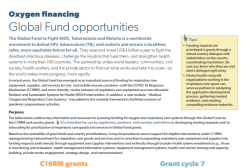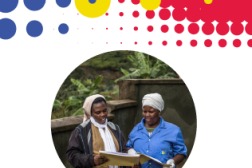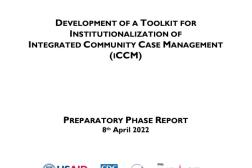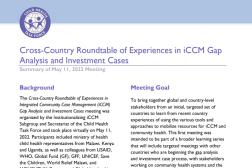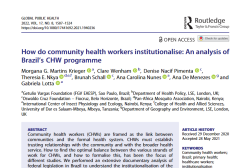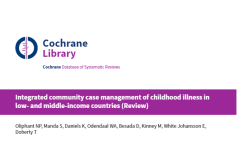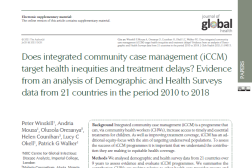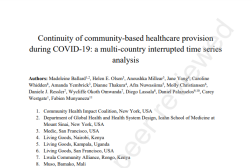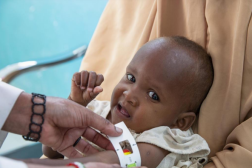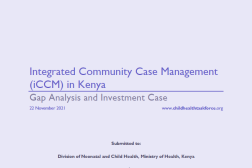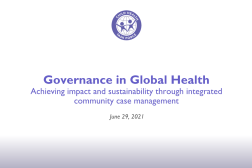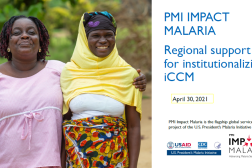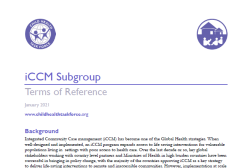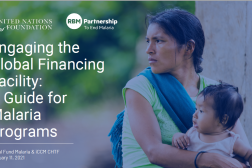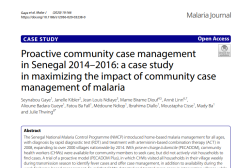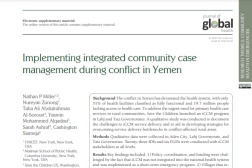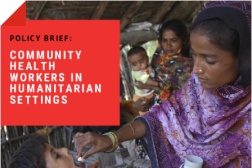Welcome to the Child Health Task Force Resource Library. This database hosts a range of documents from agencies and organizations working on child health programming. When using the search function, please be as specific as possible. More specific search language will return the most appropriate results. Resources are available for download for further reading and can be sent via email or other social media platforms for ease of sharing.
If you have resources related to child health programming that you would like to share through the Child Health Task Force, please reach out through our Contact Us page.
We recommend searching for an author (by name) if you are looking for a specific report. You may also use the filters to refine your search by country, language, etc.
Tool | English | 2023
CHW Programmatic Gap Table Example Global Fund Application
Completed example of a community health worker (CHW) programmatic gap table to be included in the Global Fund proposal.
CHW Programmatic Gap Table Example Global Fund Application183.74 KBReport | English | 2023
Oxygen financing: Global Fund opportunities
This brief outlines key information and resources for pursuing funding for oxygen and respiratory care systems through the Global Fund via the C19RM and country grants.
Guide | English | 2023
Detailed Instructions for Completing the CHW Programmatic Gap Table for Global Fund Funding Requests
These detailed instructions explain how to complete the Community Health Worker (CHW) Programmatic Gap Table (template here) as part of the Global Fund proposal (disease-specific and RSSH funding requests).
Detailed Instructions for Completing the CHW Programmatic Gap Table for Global Fund Funding Requests223.3 KBGuide | English | 2023
Guidance Note: Accessing and Programming Matching Funds, Allocation Period 2023 - 2025 Global Fund
This document provides strategic guidance to applicants eligible for additional catalytic Matching Funds beyond the allocation amount for the 2023-2025 allocation period from the Global Fund.
Report | English | 2022
Development of a Toolkit for Institutionalization of Integrated Community Case Management (iCCM), Preparatory Phase Report
The Institutionalizing Integrated Community Case Management (iCCM) Subgroup of the global Child Health Task Force (CHTF) is developped a toolkit to support country stakeholders to institutionalize iCCM. This work is being supported by the U.S. President’s Malaria Initiative (PMI) Impact Malaria program through PSI's Health System Accelerator and has been divided into two distinct phases - a preparatory phase from October 2021 to March 2022, followed by a toolkit development phase from April to September 2022.
Development of a Toolkit for Institutionalization of Integrated Community Case Management (iCCM), Preparatory Phase Report1.07 MB2022
Summary Report - Cross-Country Roundtable of Experiences in iCCM Gap Analysis and Investment Cases
The Cross-Country Roundtable of Experiences in Integrated Community Case Management (iCCM) Gap Analysis and Investment Cases meeting was organized by the Institutionalizing iCCM Subgroup and Secretariat of the Child Health Task Force and took place virtually on May 11, 2022. Participants included ministry of health child health representatives from Malawi, Kenya and Uganda, as well as colleagues from USAID, WHO, Global Fund (GF), GFF, UNICEF, Save
Summary Report - Cross-Country Roundtable of Experiences in iCCM Gap Analysis and Investment Cases269.72 KBEvent Materials | English | 2022
Q&A from Global Fund Information Session - December 7, 2022
Following up on the Information Session: New Opportunities for Improving Funding for iCCM through the Global Fund Application session, here are the Q&A with responses from the presenters to participant questions.
Q&A from Global Fund Information Session - December 7, 2022170.1 KBJournal Article | English | 2021
How do community health workers institutionalise: An analysis of Brazil’s CHW programme
This Global Public Health article offers three contributions to the literature: the development and application of an analytical framework to consider the institutionalisation process of CHWs; a historical analysis of the professional institutionalisation of CHW in Brazil; and the identification of the paradoxes that such institutionalisation faces: firstly, institutionalisation focused on improving CHW remuneration created difficulties in hiring and paying these professionals; when CHW are incorporated within state bureaucracy they start to lose their autonomy as com
Journal Article | English | 2021
Integrated community case management of childhood illness in low‐ and middle‐income countries
This Cochrane Review aimed to assess the effects of integrated community case management (iCCM) for children under‐five in low‐ and middle‐income countries. The review authors collected and analysed all relevant studies to answer this question and found seven studies.
Journal Article | English | 2021
Does integrated community case management (iCCM) target health inequities and treatment delays?
This article co-authored by the MRC Centre for Global Infectious Disease Analysis and Malaria Consortium presents evidence from an analysis of Demographic and Health Surveys data from 21 countries in the period 2010 to 2018.
Journal Article | English | 2021
Continuity of Community-Based Healthcare Provision During COVID-19: A Multi-Country Interrupted Time Series Analysis
Analysis of continuity of essential services in several “well-supported” CHW programs, which include iCCM
Report | English | 2021
Policy, Program, and Operational Learnings Report of iCCM/CMAM Integration
USAID-funded MOMENTUM Country and Global Leadership developed this report in September 2021 to share learnings and programmatic experiences of integrating community-based management of acute malnutrition (CMAM) and integrated community case management (iCCM). The report presents key findings from a literature review of peer-reviewed articles, technical documents, program reports, consultative meeting proceedings, and global and national guidelines that focus on integrating these strategies.
Report | English | Kenya | 2021
Integrated Community Case Management in Kenya: Gap Analysis and Investment Case
This report was commissioned by the Child Health Task Force and developed by Save the Children Kenya in collaboration with the Ministry of Health in 2021. It provides an account of the status of the iCCM strategy in Kenya, the gaps in its delivery system, and the case for investment. The investment case was informed by desk reviews, key informant interviews, and case studies from Busia, Turkana, and Kisumu counties.
Integrated Community Case Management in Kenya: Gap Analysis and Investment Case814.01 KBPresentation | English | 2021
iCCM Governance Presentation (ISGlobal, Allen) - June 29, 2021
Presentation from the webinar hosted by the iCCM subgroup of the Child Health Task Force on June 29, 2021: Governance in Global Health: Achieving impact and sustainability through integrated community case management. The speaker and author of the slides is Dr. Koya Allen (MESA Scientific Officer, Barcelona Institute for Global Health). The session was moderated by subgroup co-chairs Mr. Humphreys Nsona (Malawi MOH) and Anne Linn (PMI/USAID).
iCCM Governance Presentation (ISGlobal, Allen) - June 29, 20213.74 MBPresentation | English | 2021
PMI IM and iCCM Subgroup Kickoff Meeting Presentation (L. Barat, Impact Malaria) - April 30, 2021
Presentation slides for the Institutionalizing iCCM subgroup meeting on April 30, 2021, to launch the collaboration with President's Malaria Initiative (PMI) Impact Malaria (IM) on an institutionalizing iCCM toolkit and webpage.
PMI IM and iCCM Subgroup Kickoff Meeting Presentation (L. Barat, Impact Malaria) - April 30, 20212.74 MBEnglish | 2021
Institutionalizing iCCM Subgroup Terms of Reference 2021
Updated Terms of Reference for the Institutionalizing iCCM subgroup of the Child Health Task Force founded in 2018 and revised in January 2021 following a consultation with subgroup members.
Institutionalizing iCCM Subgroup Terms of Reference 2021162.13 KBPresentation | English | 2021
GFF Opportunities for Malaria iCCM Subgroup Presentation (M. Miles & T. Bracken, RBM) - February 11, 2021
Presentation slides by Tara Bracken and Melody Miles, presented at the iCCM Subgroup webinar hosted on February 11, 2021. The webinar shared highlights from The Global Financing Facility Guide for National Malaria Programs developed by RBM Partnership to End Malaria. The presentation includes background information about the GFF's purpose and function along with opportunities for engagement for malaria & iCCM programs.
GFF Opportunities for Malaria iCCM Subgroup Presentation (M. Miles & T. Bracken, RBM) - February 11, 202110.64 MBJournal Article | English | 2020
Proactive community case management in Senegal 2014–2016
This article in the Malaria Journal presents a case study in maximizing the impact of community case management of malaria through the proactive CCM approach in Senegal.
Recommended Citation: Gaye, S., Kibler, J., Ndiaye, J.L. et al. Proactive community case management in Senegal 2014–2016: a case study in maximizing the impact of community case management of malaria. Malar J 19, 166 (2020). https://doi.org/10.1186/s12936-020-03238-0
Journal Article | English | 2020
Implementing integrated community case management during conflict in Yemen
The conflict in Yemen has devastated the health system, with only 51% of health facilities classified as fully functional and 19.7 million people lacking access to health care. To address the urgent need for primary health care services in rural communities, Save the Children launched an iCCM program in Lahj and Taiz Governorates. A qualitative study was conducted to document the challenges to iCCM service delivery and to aid in developing strategies for overcoming service delivery bottlenecks in conflict-affected rural areas.
Report | English | 2020
Policy Brief: Community Health Workers in Humanitarian Settings
To better understand the barriers and enabling factors for community-based service delivery through CHWs, UNICEF, Save the Children, and the International Rescue Committee have collaborated to conduct a number of studies to document experiences with CHW services in humanitarian settings in low- and middle-income countries. Retrospective case studies were carried out in Guinea, Liberia, and Sierra Leone (Ebola outbreak); South Sudan (conflict); Bangladesh (flooding); and Yemen (conflict).

